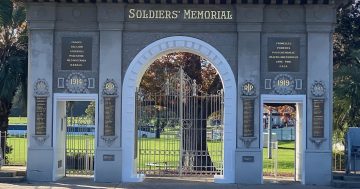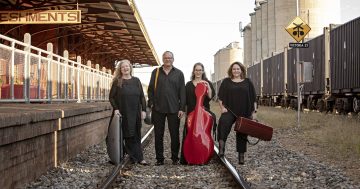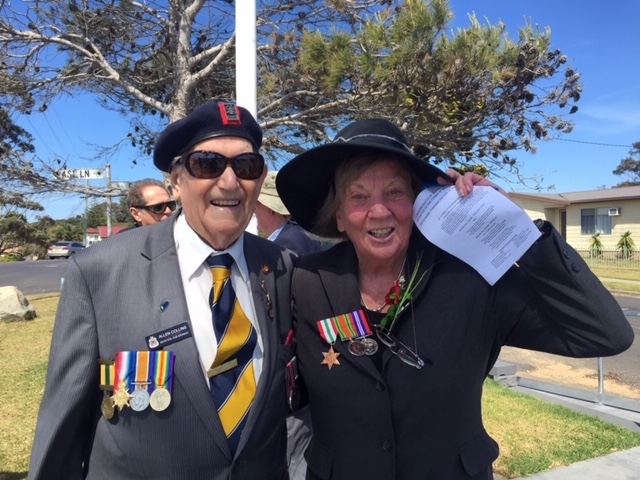
Allen Collins and Cr Liz Seckold at the Tathra Memorial for Remembrance Day. Photos: Lisa Herbert.
The recently completed Tathra Memorial has observed its first Remembrance Day service.
Allen Collins of the RSL (NSW Branch) and Councillor Liz Seckold struggled to keep hold of their programs and hats, Mr Collins telling me “we are honoured to be holding the first service here at the beautiful new memorial”.
Wendy Elliott is playing the flute for the hymns today, her music pegged firmly down against the strong Easterly. Wendy is wearing three groups of medals and she points to each one: “This is my father, this is my grandfather and these are my husband’s.”
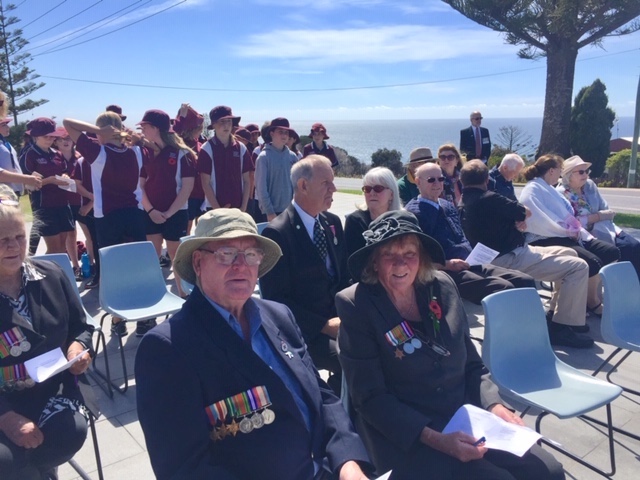
All holding firm on the new memorial paving at Tathra.
The new, pristine bluestone paving of the extended memorial is smooth and stable, able to hold many more chairs, for those who can no longer stand.
I turn as senior school children from Tathra Primary arrive with wreaths. Teacher Megan Bobbin says, “we acknowledged today at morning assembly, and some of the kids wanted to come. It’s a sign of respect, and we’re continuing the tradition of remembering”.
Allen Collins tells us stories of a number of battles. As a person who’s default setting is ‘run from all conflict’, I’d come today wanting to explore my feelings towards war and remembering. I have my personal opinions regarding the (I think dubious) need for war in the first place, but I felt myself become quite emotional during this service.
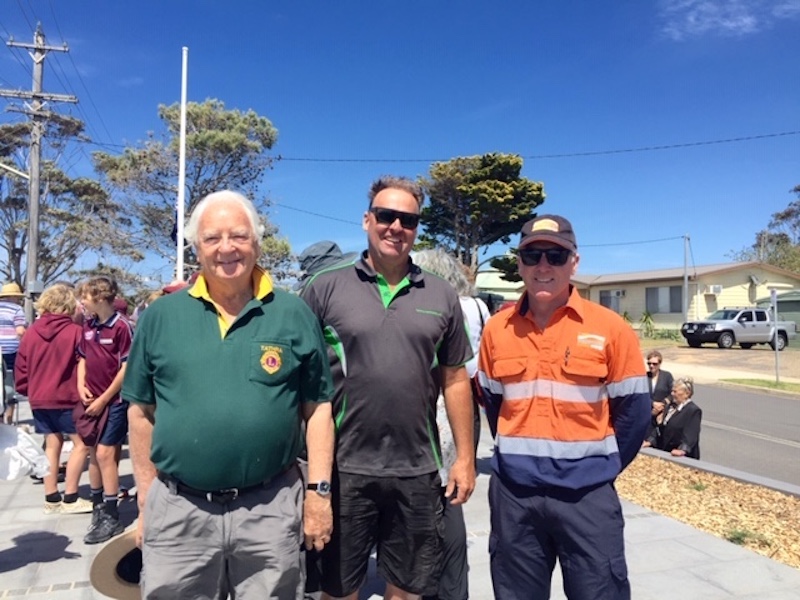
The team that built the new memorial: Rob Owen from Lions, Craig Waugh and David Scott from the Sunshine Board-riders.
Most of the prayers and hymns were unknown to me, and I read the words on the page. It was the stories from people whose lives have been affected by war that were most profoundly touching. The connection made through the spoken word, the human factor, quietly affecting all of us there.
When ex-Bega Pharmacist Paul Gardiner began his oration with the well-known poem In Flanders Fields I heard the poem through different ears.
In Flanders fields the poppies blow/Between the crosses, row on row … For the first time, I physically felt those devastating words.
Halfway through the poem Paul paused to insert his own oration on the theme of remembrance:
“I will pause here … to remember those who did not come home, those who died so that we might live in freedom and in peace …”
He went on to remind us of the things that, as Australians, we hold precious: mateship, tolerance, and generosity.
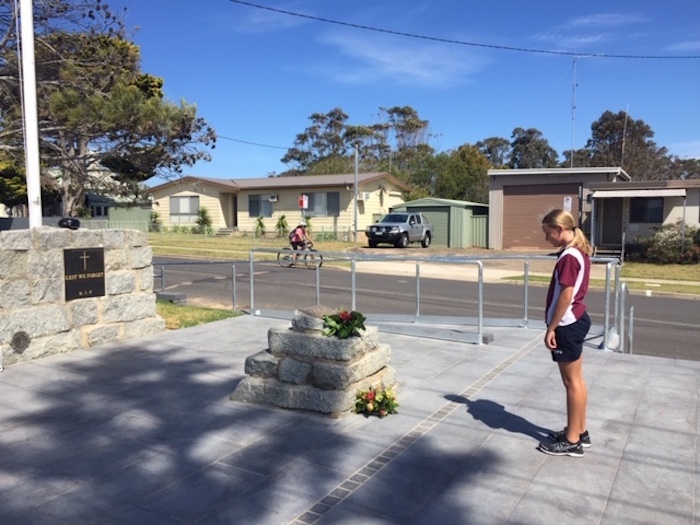
Tathra Primary School students laid wreaths.
And then Paul reminded us of the things these men and boys, women and children, did not die for:
“They did not die so the filthy rich could get filthier by destroying our beautiful planet, stuffing the proceeds into their over-crammed pockets.
“They did not die so that kids and mums, and indeed some dads, would not feel safe in the lounge-rooms of their own homes or in the streets of their own towns and villages across this vast land.
“They did not die so that those poor buggers fleeing their own homes to escape oppression, persecution, war and famine and who turned to us for help, would be pushed back into the sea.
“They did not die so that the hearts of our families and communities would be torn out by the scourge of drug abuse.
“These things are the enemy now, these are our common foe and in that spirit, I will take up the poem again …
“And we remember too the fallen of the enemy, our one-time foes. Not in a spirit of vindictiveness or hate, but in a spirit reminiscent of the time all those Christmases ago when the sound of Silent Night drifted over the quiet battlefields of the Western Front in 1914.
“So when you buy a poppy, don’t think about the price you paid for it, think about the price they have paid and where they have gone. For they have gone to Flanders fields, where those poppies blow.”
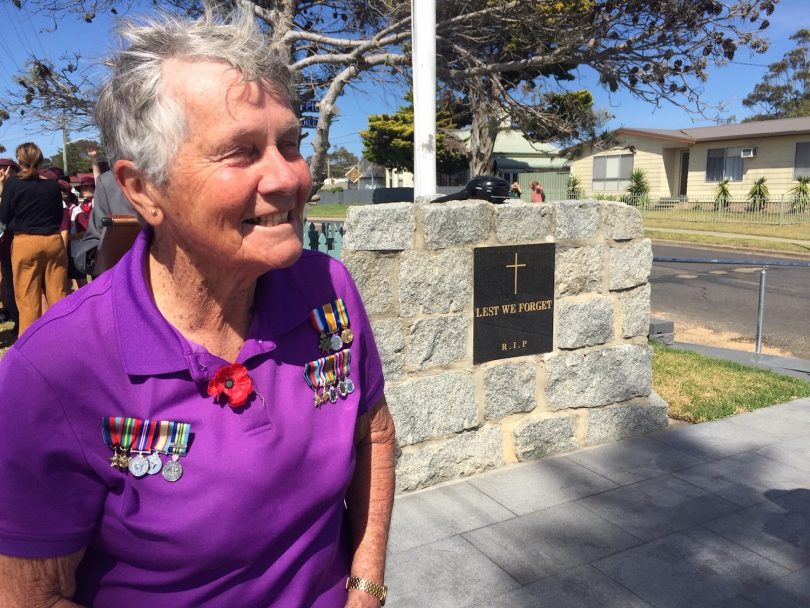
Wendy Elliott wore the medals of her father, grandfather and husband.
People were then invited up to the microphone to tell their stories.
Wendy Elliott told the story of her father who, when she was six days old, left for war. He never returned.
“I want you kids to know,” she said, “in those days, fathers didn’t get to hold their newborn babies. My father never held me, and he never came home. So you see the impact of war.”
When I was talking later to Paul, I realised that, as a church-going man, his words were spoken from a place of faith, a place of Christian values.
Is that politicising the service? Or is that reminding us all that mate-ship (or love), tolerance and generosity are values that we should all aspire to, and that perhaps our current foes are the very things Paul speaks of.
“In war, there are no winners, only losers. It is just that one side loses more than the other.”
Lest we forget.







